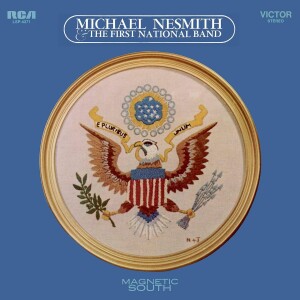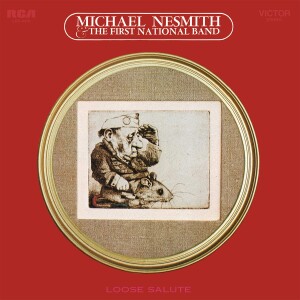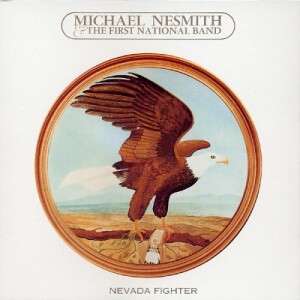 The blue, red and white trilogy of albums by Michael Nesmith & the First National Band (plus one later release in much the same vein) remain among my favorite albums more than 50 years later. Nesmith wasn’t the first rock musician to lean into country rock, but he was an early innovator and still my favorite (I know, Gram Parsons fans are rolling their eyes right now). Nesmith formed the band with drummer John Ware, bassist John London, and pedal steel guitarist O.J. “Red” Rhodes, after the end of The Monkees. They were the perfect musical companions for Nesmith’s odd, even loopy take on countryfied rock music.
The blue, red and white trilogy of albums by Michael Nesmith & the First National Band (plus one later release in much the same vein) remain among my favorite albums more than 50 years later. Nesmith wasn’t the first rock musician to lean into country rock, but he was an early innovator and still my favorite (I know, Gram Parsons fans are rolling their eyes right now). Nesmith formed the band with drummer John Ware, bassist John London, and pedal steel guitarist O.J. “Red” Rhodes, after the end of The Monkees. They were the perfect musical companions for Nesmith’s odd, even loopy take on countryfied rock music.
In mid-1970 Nesmith & the First National Band released their first single “Joanne,” a kinda sappy love song that was a minor hit in the U.S. Then in the fall of 1970 another single was out, and I liked the cantering “Silver Moon” a lot more. So one day late in the year when out record shopping with my big brother, I was thrilled to find Loose Salute by Nesmith & the First National Band, and brought it home (along with Neil Young’s After the Gold Rush if I recall correctly). It turned out Loose Salute was Nesmith’s second album, and when my brother brought home the blue-covered first one Magnetic South a little while later, it somehow migrated permanently into my collection.
 They were the first two of that trilogy by Nesmith and band – the third was the white-jacketed Nevada Fighter – all released within a span of less than 12 months. Although if forced to choose just one I’d probably go with Magnetic South, all three have their charms. All are fairly brief affairs, and mix Nesmith originals with choice covers, either of classic country songs or contemporary country rock fare.
They were the first two of that trilogy by Nesmith and band – the third was the white-jacketed Nevada Fighter – all released within a span of less than 12 months. Although if forced to choose just one I’d probably go with Magnetic South, all three have their charms. All are fairly brief affairs, and mix Nesmith originals with choice covers, either of classic country songs or contemporary country rock fare.
That first album starts off with Nesmith strumming uptempo licks on his 12-string accoustic guitar before being joined by Rhodes, London and Ware on the galloping “Calico Girlfriend,” and we’re off. Right from the start they had a unique sound, a stripped down quartet of acoustic guitar, bass, drums and Rhodes’s psychedelic pedal steel. If you’re familiar with Nesmith’s biggest hit song, “Different Drum” as recorded by Linda Ronstadt and the Stone Ponies, you’d recognize the themes of most of his songs on this album: sardonic, trippily philosophical takes on relationships that aren’t working out so well.
The first side of all originals ends with “Joanne,” or rather almost does – after the final soft chord fades away, the band reenters with a crash and runs through Rhodes’s “First National Rag” as Nesmith encourages the listener to “turn the record over.” A bit of silly Monkees-type humor tacked on, which has come and gone through the years as the album has been reissued on CD in various packages. Side two is more Nesmith songs but things get a bit more creative and less straightforward. After a bit of yodel-type singing on “Joanne” he really turns it up on Side 2, hitting some real high notes Jimmie Rodgers style on the rocking “Mama Nantucket” and the folksy “Keys To The Car.” On the penultimate track he just goes whole hog and covers Rodgers’ hit “One Rose,” a lilting waltz penned by Hawaiian guitarist Lani McIntyre.
 But before “One Rose” and again on the final track, Nesmith digs into his bag of production tricks on a couple of decidedly different songs. “Hollywood” is his look backward at his time in television land, calling it a “cru-el town” and “a fair-weather friend.” Nesmith’s vocals on the first two lines of each verse are far off and echo-laden, accompanied by his acoustic, London’s bass and Ware’s hi-hat (the bass and cymbal way out front in the mix) and some piano from guest Earl Poole Ball. London carries the song on solo bass guitar for extended periods, and Rhodes has a blistering solo at one point as Ware absolutely attacks his toms; on each verse’s third and final line, pedal steel and vocals come to the fore. It’s a twist on the classic blues lyrical formula, the first two lines stating the problem and the third Nesmith’s response to it, but in a high-concept rock song.
But before “One Rose” and again on the final track, Nesmith digs into his bag of production tricks on a couple of decidedly different songs. “Hollywood” is his look backward at his time in television land, calling it a “cru-el town” and “a fair-weather friend.” Nesmith’s vocals on the first two lines of each verse are far off and echo-laden, accompanied by his acoustic, London’s bass and Ware’s hi-hat (the bass and cymbal way out front in the mix) and some piano from guest Earl Poole Ball. London carries the song on solo bass guitar for extended periods, and Rhodes has a blistering solo at one point as Ware absolutely attacks his toms; on each verse’s third and final line, pedal steel and vocals come to the fore. It’s a twist on the classic blues lyrical formula, the first two lines stating the problem and the third Nesmith’s response to it, but in a high-concept rock song.
For the final track, it’s as though Nesmith figured if The Beatles could end Sgt. Pepper’s Lonely Hearts Club Band with the epic “A Day In The Life,” he could end his debut with an epic about … a day in the life of a tractor-riding farmer. (Just a note, Nesmith was at Abbey Road during part of the recording of Sgt. Pepper.) The song itself is “Beyond The Blue Horizon,” a Top 10 hit in 1930 for Jeanette McDonald. The track begins with the ticking of an alarm clock and crowing of a rooster; then the alarm goes off, the farmer yawns and gets out of bed and starts humming the tune, the band fades in, the screen door slams, and a tractor starts and putts off into the distance. Nesmith sings the song through twice with rising intensity that shows off his impressive pipes, then we hear the tractor returning, shutting down, and the track fades on crickets chirping. I don’t know of anything else being recorded like this in 1970 or since, really. It’s simultaneously moving and corny, a serious technical and musical endeavor and an eyeroll inducing over-the-top novelty. I love it.
Loose Salute is a classic middle child, overshadowed a bit (in my mind) by its younger and older siblings. It follows a similar pattern to its predecessor – mostly Nesmith compositions, a Monkees leftover or two, and a choice classic country cover – but the sound and production are a bit more sophisticated. The cover “I Fall To Pieces” is peppier but otherwise faithful to Patsy Cline’s hit version. “Listen To The Band” is more country than the Monkees’ version, and “Conversations” was developed from one of that band’s outtakes. The tropical “Tengo Amore” with its high school Spanish lyrics sounds like it comes from the Monkees days. The hit single “Silver Moon” and “Conversations” hew to the “sardonic love song” formula but much of the album goes off on other themes, like the rebel trucker anthem “Bye, Bye, Bye” and the philosophical twofer “Thanx For The Ride” and “Dedicated Friend.”
Nevada Fighter came out in mid-’71 and pretty much sank like a stone, which is a shame. It’s more varied and I think sophisticated and holds together thematically. Side one is all originals and side two all covers but for the short Red Rhodes instrumental coda “René.” The opener “Grand Ennui” is a satiric look at a bored millionaire’s life and the title track that closes side one is a rather bitter abstract tale of what seems to be an American Indian veteran who’s ignored by the country he served. Three love songs lie between those bookends, the tender “Here I Am,” the old-timey waltz “Only Bound,” and the Monkees-era “Propinquity (I’ve Just Begun To Care),” most successfully covered by the Nitty Gritty Dirt Band.
The covers on side two are really interesting. Nesmith pairs Michael Murphey’s woebegon love song “Texas Morning” with the Sons of the Pioneers’ classic “Tumbling Tumbleweeds,” to great effect and with some stunning psychedelic steel guitar lines joining them up. It’s followed by a smashing cover of “I Looked Away” (the opening track on Derek & The Dominos’ Layla and Other Assorted Love Songs), complete with some wailing Hammond B-3. (I don’t know if he got the idea of pairing pedal steel and B-3 from George Harrison’s All Things Must Pass, which was released in late 1970, but it’s an inspired bit of production.) And finally Harry Nilsson’s “Rainmaker” is a portentous allegory of the consequences of failing to follow through on a promise.
I suspect I was not alone in 1970 and ’71 in being a fan of both classic country and modern rock, who discovered the joys of country rock through Nesmith & the First National Band’s records. These three albums were a brief flash in the pan of popular music of that era, but they’ve had a long legacy and remain in print, followed by faithful fans worldwide.
(RCA, 1970, 1970, 1971)
